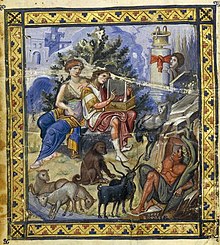
 | |||||
| Tanakh (Judaism) | |||||
|---|---|---|---|---|---|
|
|
|||||
| Old Testament (Christianity) | |||||
|
|
|||||
| Bible portal | |||||
The Book of Psalms (/sɑː(l)mz/ SAH(L)MZ, US also /sɔː(l)mz/ SAW(L)MZ;[2] Biblical Hebrew: תְּהִלִּים, romanized: Tehillīm, lit. 'praises'; Ancient Greek: Ψαλμός, romanized: Psalmós; Latin: Liber Psalmorum; Arabic: زَبُورُ, romanized: Zabūr), also known as the Psalms, or the Psalter, is the first book of the third section of the Tanakh (Hebrew Bible) called Ketuvim ('Writings'), and a book of the Old Testament.[3]
The book is an anthology of Hebrew religious hymns. In the Jewish and Western Christian traditions, there are 150 psalms, and several more in the Eastern Christian churches.[4][5] The book is divided into five sections, each ending with a doxology, or a hymn of praise. There are several types of psalms, including hymns or songs of praise, communal and individual laments, royal psalms, imprecation, and individual thanksgivings. The book also includes psalms of communal thanksgiving, wisdom, pilgrimage and other categories.
While many of the psalms contain attributions to the name of King David and other Biblical figures including Asaph, the sons of Korah, and Solomon, David's authorship is not accepted by most modern Bible scholars, who instead attribute the composition of the psalms to various authors writing between the 9th and 5th centuries BC. The psalms were written from the time of the Israelite conquest of Canaan to the post-exilic period and the book was probably compiled and edited into its present form during the post-exilic period in the 5th century BC.[5]
In English, the title of the book is derived from the Greek word ψαλμοί (psalmoi), meaning 'instrumental music' and, by extension, 'the words accompanying the music'.[6] The Hebrew name of the book, Tehillim (תהילים), means 'praises', as it contains many praises and supplications to God.
- ^ Helen C. Evans; William W. Wixom, eds. (5 March 1997). The Glory of Byzantium: Art and Culture of the Middle Byzantine Era, A.D. 843-1261. Metropolitan Museum of Art. p. 86. ISBN 9780870997778. Retrieved 5 March 2018 – via Internet Archive.
- ^ "Psalm." Longman Pronunciation Dictionary. Pearson.
- ^ Mazor 2011, p. 589.
- ^ Kselman 2007, p. 775.
- ^ a b Berlin & Brettler 2004, p. 1282.
- ^ Murphy 1993, p. 626.